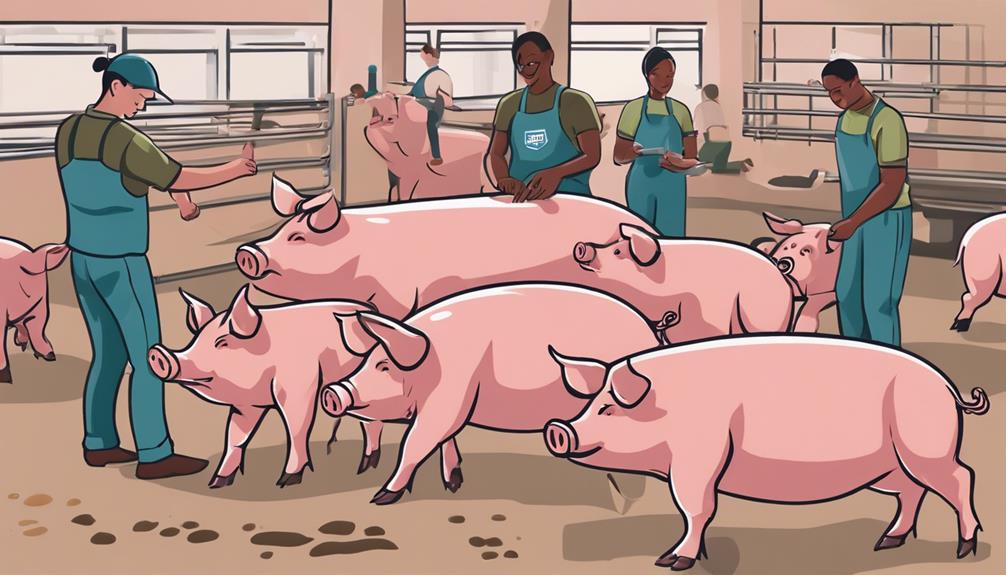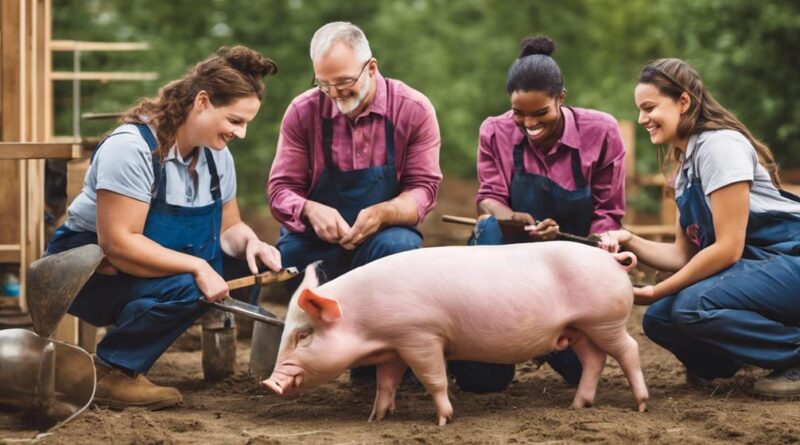Local Pig Training Schools: A Comprehensive Guide
Imagine the satisfaction of seeing your pig master new commands or overcome challenging behaviors. Local Pig Training Schools offer a wealth of knowledge and resources to help you in this endeavor. From understanding pig behavior to mastering training techniques, each aspect plays a crucial role in shaping your pig's behavior.
But how do you navigate the multitude of options available and find the perfect fit for your pig's training needs? Let's explore the essential factors to consider when selecting a local pig training school that meets your requirements and sets you up for success.
Finding Local Pig Training Schools

When looking for local pig training schools, start by checking online directories and contacting local agricultural organizations for recommendations. These resources can provide valuable information on reputable institutions offering various pig training methods. Local resources, such as farm supply stores or veterinary clinics, may also have knowledge of nearby schools specializing in pig training.
In your search, consider the different pig training methods available at each school. Some schools may focus on positive reinforcement techniques, while others may use more traditional methods. It's essential to choose a training approach that aligns with your values and the well-being of the pigs.
Additionally, reach out to local pig farmers or breeders who've experience with pig training. They can offer insights into which schools have a good reputation and which methods are most effective for training pigs. Networking within the agricultural community can lead you to the best local pig training school for your needs.
Evaluating Pig Training Programs
To effectively assess pig training programs, consider evaluating the curriculum, practical training opportunities, and success stories of graduates from various schools in your area. When assessing the curriculum, look for programs that incorporate principles of behavioral psychology and positive reinforcement techniques. A strong curriculum should cover topics such as pig behavior, communication, obedience training, and problem-solving strategies. Programs that emphasize positive reinforcement methods are often more successful in training pigs effectively and promoting good behavior.
Practical training opportunities are crucial when evaluating pig training programs. Hands-on experience allows students to apply theoretical knowledge in real-life situations. Look for programs that offer practical sessions where students work directly with pigs under the guidance of experienced trainers. These practical experiences help students develop their skills and confidence in handling and training pigs.
Additionally, it's essential to explore the success stories of graduates from different pig training programs. Hearing about the experiences of past students can provide valuable insights into the effectiveness of a program. Look for schools with a track record of producing skilled pig trainers who've successfully trained pigs using positive reinforcement techniques. Success stories can give you a glimpse of what to expect from a particular training program and help you make an informed decision when choosing a pig training school.
Choosing the Right Pig Trainer
Consider carefully selecting a pig trainer who aligns with your training goals and values. When choosing a pig trainer, it's crucial to assess their methods and ethical considerations. Look for experienced trainers who have a track record of success with pigs.
Evaluate the trainer's approach to pig training. Some trainers may focus on positive reinforcement, while others may use different methods. Ensure that the trainer's techniques align with what you're comfortable with and believe in. Ethical considerations should also play a significant role in your decision-making process.
Experienced trainers often have higher success rates when it comes to pig training. Look for trainers who have worked with a variety of pigs and have achieved positive results. Their experience can make a significant difference in the effectiveness of the training sessions.
Before making a final decision, consider reaching out to past clients or reading reviews to gauge the trainer's success rates and reputation. A trainer who aligns with your values, uses effective and ethical methods, and has a proven track record of success is more likely to help you achieve your pig training goals.
Understanding Pig Behavior
Explore the intricacies of pig behavior to enhance your understanding of these intelligent animals. Pigs have complex psychology influenced by their natural instincts and social hierarchy. Understanding pig psychology is crucial for effective behavior modification during training. Pigs are highly social animals that form strong bonds with their herd members. They communicate through various vocalizations, body language, and even by using their sense of smell.
When delving into pig behavior, it's essential to recognize that they're naturally curious and intelligent creatures. Pigs are known to be resourceful problem solvers, capable of learning new tasks quickly. Their intelligence makes them responsive to training techniques and behavior modification strategies. By understanding pig psychology, trainers can tailor their methods to suit the individual pig's needs and personality.
Behavior modification plays a significant role in pig training. Positive reinforcement is a key technique used to encourage desirable behaviors in pigs. By rewarding good behavior with treats or praise, pigs learn to associate positive outcomes with specific actions. On the other hand, negative reinforcement, such as withholding treats for undesirable behaviors, can also be effective in shaping pig behavior. Consistency and patience are vital when implementing behavior modification techniques to ensure long-lasting results. By grasping the fundamentals of pig psychology and behavior modification, you can establish a strong foundation for successful pig training.
Training Techniques for Pigs
Enhance your pig training skills by implementing effective techniques tailored to their intelligence and social nature. When training pigs, it's essential to utilize positive reinforcement. Pigs respond well to rewards such as treats, praise, or even a good belly rub. Positive reinforcement helps reinforce desired behaviors and strengthens the bond between you and your pig.
Clicker training is another valuable technique for pig training. By associating the sound of a clicker with a reward, you can effectively communicate with your pig. When your pig performs the desired behavior, immediately click the clicker and follow it with a treat. This helps your pig understand exactly what they did right, making the training process more efficient.
Consistency is key when training pigs. Be clear and concise in your commands, and always follow through with rewards or corrections. Pigs are intelligent animals and can quickly pick up on patterns, so consistency in training will yield better results.
Remember that each pig is unique, so it's essential to be patient and understanding during the training process. Celebrate small victories and progress, and don't get discouraged by setbacks. With the right training techniques, positive reinforcement, and clicker training, you can effectively train your pig and strengthen your bond with them.
Facilities and Equipment Needed
To effectively train your pig, ensure you have the appropriate facilities and equipment in place. Creating a conducive environment for training is essential for the success of your pig training endeavors. Here are some key components you need to consider:
- Training Tools: Having the right training tools is crucial for effective pig training. Items such as target sticks, clickers, and treats are commonly used in pig training to reinforce positive behavior and facilitate learning.
- Exercise Areas: Designated exercise areas are vital for keeping your pig active and healthy. Ensure you have a spacious and secure area where your pig can roam, explore, and engage in physical activities.
- Shelter: Providing appropriate shelter is important to ensure your pig's safety and comfort. Whether it's a barn, shed, or insulated pig house, make sure your pig has a secure place to rest and seek shelter from the elements.
- Feeding Stations: Establishing designated feeding stations helps create a routine for your pig's meals. This can aid in training and prevent food-related behavioral issues.
- Cleaning Supplies: Keeping your pig's living area clean is essential for their health and well-being. Stock up on cleaning supplies such as brushes, disinfectants, and bedding materials to maintain a hygienic environment for your pig.
Certification and Accreditation

When considering local pig training schools, it's essential to verify their certification and accreditation to ensure they meet industry standards. Certification requirements for pig training schools may vary, but most reputable institutions will have certifications that demonstrate their commitment to quality and professionalism in the field of pig training. Look for schools that have been accredited by recognized associations or governing bodies related to animal training.
Ensuring that a pig training school meets industry standards is crucial for receiving a high-quality education. You should inquire about the specific certification requirements that the school has met, as this will give you insight into the level of training and education you can expect to receive. Industry standards often cover areas such as animal welfare, training techniques, and facility requirements.
Before enrolling in a pig training school, be sure to ask about their accreditation status and certification requirements. This information will help you make an informed decision about which school aligns best with your goals and values. Choosing a certified and accredited pig training school won't only provide you with a valuable education but also give you confidence in your training abilities as you enter the field of pig training.
Cost of Pig Training Schools
Considering the expenses involved, understanding the cost of attending pig training schools is crucial for prospective students. When evaluating the cost of pig training schools, there are several key aspects to consider:
- Tuition Fees: The primary cost of attending a pig training school is the tuition fees, which can vary depending on the program's duration and the school's reputation.
- Additional Costs: In addition to tuition, students should factor in additional costs such as study materials, equipment, and any necessary uniforms or gear.
- Housing and Transportation: If the pig training school is located far from your home, you'll need to consider the costs of housing and transportation for the duration of the program.
- Scholarships and Grants: Explore the availability of scholarships and grants to help offset the cost of tuition. Many pig training schools offer financial aid options based on merit or financial need.
- Payment Plans: Some pig training schools may offer flexible payment plans to help students manage the cost of tuition over time, rather than paying a lump sum upfront.
Understanding the training school affordability and exploring financial assistance options can help make attending pig training school more feasible for prospective students. Be sure to thoroughly research and compare the costs and available support options before making a decision.
Frequently Asked Questions
Can Pigs Be Trained to Do Specific Tricks or Tasks Like Dogs?
Yes, pigs can be trained to do specific tricks or tasks like dogs. They're intelligent animals and can learn various behaviors through positive reinforcement training methods.
By using rewards like treats or praise, you can teach your pig to perform tricks, follow commands, or even participate in agility courses.
Consistency, patience, and understanding your pig's individual learning style are key to successful training.
Are There Any Age Restrictions for Enrolling a Pig in a Training Program?
When enrolling a pig in a training program, age eligibility is a crucial factor to consider. Pig maturity plays a significant role in determining if they're ready for training.
Different training programs may have specific age restrictions based on the training requirements. It's essential to check with the school or trainer to ensure your pig meets the age criteria for enrollment and can benefit fully from the training program.
How Long Does It Typically Take to See Results From Pig Training?
To see results from pig training, it typically takes time and training consistency. Behavior modification and positive reinforcement techniques can speed up progress. Your time commitment plays a crucial role in how quickly your pig learns.
What Are Some Common Challenges That Pig Owners Face During Training?
When training pigs, you may encounter various behavioral challenges. Some common issues include stubbornness, distraction, and fear. To tackle these challenges, focus on using positive reinforcement techniques.
Additionally, working on socialization skills can help your pig become more comfortable and responsive. By being patient, consistent, and utilizing effective reinforcement methods, you can overcome these obstacles and make the training process smoother for both you and your pig.
Are There Any Specialized Training Programs for Therapy Pigs or Service Pigs?
Yes, there are specialized training programs available for therapy and service pigs. These programs focus on teaching emotional support skills and certification for these special roles.
They use specific training techniques and behavior modification methods to prepare pigs for their important jobs.
Training for therapy and service pigs differs from regular training due to the unique tasks they'll perform to assist individuals in need.
Conclusion
Overall, finding a local pig training school can be a rewarding experience for both you and your pig. By evaluating programs, choosing the right trainer, and understanding pig behavior, you can set yourself up for success in training your pig.
Remember to consider facilities and equipment, certification, and cost when making your decision. With dedication and patience, you'll be on your way to having a well-trained and happy pig. Good luck!
